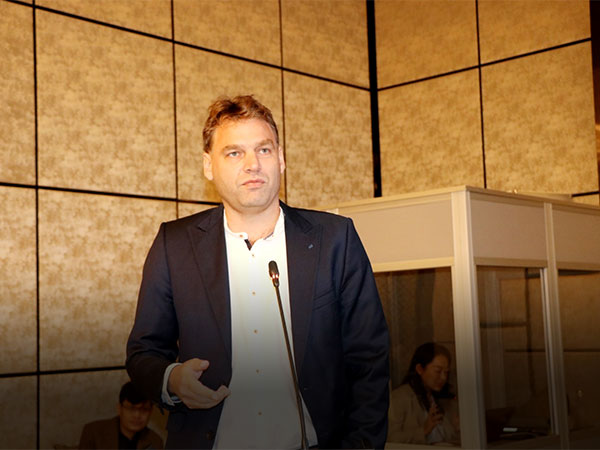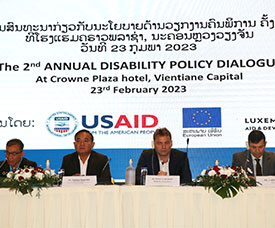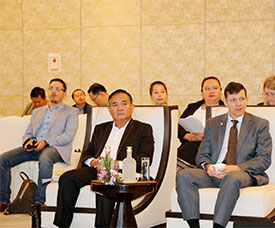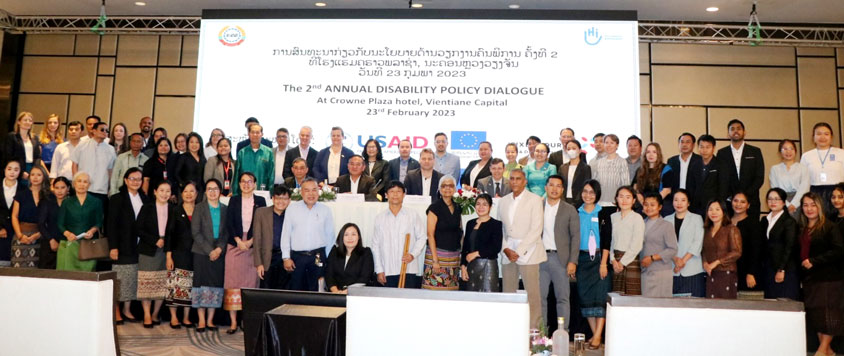Transforming rhetoric into action on disability inclusive development in Laos
The National Committee for Persons with Disabilities (NCPD), Ministry of Labour and Social Welfare in partnership with Humanity & Inclusion and organisations of persons with disabilities (OPD) organised the 2nd Annual Disability Policy Dialogue 2023 in Hotel Crowne Plaza, Vientiane on 23rd Feb 2023. The primary objective of this event was to identify the barriers faced by persons with disabilities in becoming recipients of socio-economic development in the country on an equal basis and also to explore opportunities for key development partners to promote disability inclusion within the national development agenda. The policy dialogue intends to strengthen partnership between the government and development partners in making development inclusive for persons with disabilities in the Lao PDR.
 |
| Humanity & Inclusion Country Representative welcoming the participants of 2nd policy dialogue 2023. |
The policy dialogue 2023 was organised with the financial support from the USAID- Learn to Read, Luxemburg Development Cooperation and European Union. Relevant line ministries of the Government of the Lao PDR, UN entities, Donor agencies, INGOs and Non-Profit Associations (national CSOs) participated in the panel discussions that were moderated by Regional Inclusive Governance Specialist and Senior Gender Equality and Social Inclusion Specialist from Humanity & Inclusion, an international NGO working with and for persons with disabilities in 60 countries and co-winner of Nobel peace prize in 1997.
The panel discussions for the 2nd policy dialogue focussed on key outcomes/outputs of the 9th NSEDP such as access to nutrition and mental health, inclusive education, equal access to socio-economic development opportunities and access to justice for persons with disabilities.
According to the Brief Disability Model Survey 2019 prevalence of anxiety and depression in the Lao PDR is 19.8 percent and 11.8 percent respectively. Dr Chantharavady, one of the panelists and well-known Psychiatrist in the country reiterated the importance of mental health and well-being. As on date there is no organisation or self-help group for persons with psychosocial disabilities in the Lao PDR unlike in many developing countries to promote person centred, rights-based recovery approach in mental health. The policy dialogue focused on the need for access to mental health services and psychotropic medicines for persons with psychosocial disabilities in remote districts and villages. The need for training General Practitioners and Nurses in identifying mental health issues were aptly emphasized.
The discussion on access to nutrition focused on school meal programmes in the Lao PDR and inclusion of children with disabilities. World Food Programme has undertaken a thematic review on barriers faced by children with disabilities in accessing school feeding and inclusive education and are in the process of developing a 2-year disability inclusion action plan which could be one of the preferred practices for development partners keen on promoting disability inclusion. Panelists from UNICEF and CRS spoke about the need for disaggregated data on children with disabilities who are in need of nutrition related services, importance of looking at nutrition support services from a disability lens and engaging mothers and care-givers as stakeholders in nutrition services.
Article 30 and 31 of the Law on Persons with Disabilities is about the access to education in an inclusive setting and addresses specific learning needs of children with disabilities including those with intellectual disabilities. The panelist representing UNICEF highlighted some of the initiatives along with the government in data collection, quality of data collected, community focus with regards to inclusive education, digital learning platform launched by UINICEF and how it can be used to integrate training related to inclusive education. One of the parents of a child with Autism as a panelist highlighted the concern about shortage of trained teachers in inclusive education and about the barrier’s children with intellectual disabilities face in accessing mainstream education.
 |
 |
| Stage photo of the chief guests from government and USAID. |
Photo of representatives from MoLSW and USAID.
|
Lao PDR has ratified the Convention on the Rights of Persons with Disabilities (CRPD) and access to justice is one of the critical rights that the state parties are expected to ensure for persons with disabilities. One of the recommendations of the CRPD committee during the concluding observations is about training the judicial officials on disability inclusion and in making Village Mediation Units accessible to persons with disabilities. Speaking as one of the panelists, the representative of the Asia Foundation expressed their organisation commitment to make legal aid more accessible for persons with disabilities and to partner with organisation of persons with disabilities in training in the National Master Trainers on access to justice.
UNDP expressed its intention of ensuring disability inclusion across relevant governance sector projects and programs in the Lao PDR and reiterated their support to the national government in implementing the recommendations of the CRPD committee. UNDP’s support to the OPDs in submission of the report to the CRPD committee and their participation in the review process in 2022 has further strengthened government’s engagement with the OPDs. Legislature oversight expedites the process of disability inclusive development and it is anticipated that the 5-year project on Strengthening Capacity and Effectiveness of the People’s Assemblies System in Laos (STEP) implemented by UNDP with the financial assistance of USAID will contribute to disability inclusive development in the Lao PDR.
There is a strong bi-directional link between Rule of Law and Disability Inclusion. Countries that have stronger adherence to Rule of Law have been able to make governance inclusive for citizens with disabilities. Participating in the panel discussion EU representative in the Lao PDR highlighted the complementarity between disability inclusion and good governance
Majority of persons with disabilities live in villages and the village administration is the first line of contact for persons with disabilities and their families. Sensitisation of the Village Leaders and members of the Village level Committees can result in disability inclusion and enable persons with disabilities to access socio-economic development programmes. The panel discussion on access to socio-economic development focused on women leadership and how women with disabilities could be included in the current strategies and policy frameworks so that they are not left behind. The panelists discussed the need for defining ‘good health’ which is one of the prescribed conditions to be complied by candidates applying for the position in civil service.
The 2nd disability policy dialogue 2023 succeeded in bringing the disability inclusion stakeholders on a common platform to discuss how best the 9th NSEDP could address the needs and concerns of persons with disabilities. It also reminded development partners that it is imperative for the Lao PDR to develop its own ‘theory of change’ on disability inclusive development led by the nodal ministry and in close collaboration with development partners and organisations of persons with disabilities as they have a pivotal role to play in disability inclusion.
About the author: This is article is contributed by the Humanity & Inclusion
 |
| Group photo of 2nd Annual Disability Policy Dialogue 2023. |
(Latest Update March 10, 2023)
|